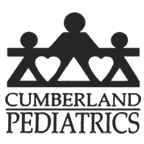Parent Center
- What do I need to bring to my child's visit?
Please bring a copy of your child's immunization record, a picture id of the adult accompanying the child and your child's insurance card. If your child is a newborn we will need the hospital discharge papers. Please refer to our new patients vs. current patients page for more information.
If Cumberland Pediatrics or one of our providers isn't listed on your insurance card, call your insurance company and have it changed prior to your visit, otherwise you may be asked to reschedule.
Download our new patient forms and complete them prior to your visit. If your child is coming in for an ADHD consultation or an asthma check-up, there are additional forms on the patient forms page that may also be downloaded and completed prior to your visit. - What if I can't bring my child?
If your child is coming with a relative or friend and that information is not already on his/her chart, please fill out the following form fax it to us 770-951-5408 or send it with your child
Authorization for Medical Care Form - Will I always see the same pediatrician?
Hopefully, yes. We encourage our patients to build a trusting relationship with their pediatrician. If you prefer to see a certain provider let the receptionist or nurse know in advance. Sometimes your provider may be out of town, or it may be their day off. Our staff will make every effort to schedule your visit with the MD of your choice. - Do I need an appointment every time my child needs to be seen?
Yes. We are NOT a walk-in clinic. However, if your child is sick, please call as soon as possible to schedule a same day appointment.
Please try to schedule physical exam appointments 2-3 months in advance and make your follow-up appointments prior to leaving the office. - May I meet the doctors before my child becomes a patient?
Please feel free to schedule an appointment with the front office staff and they will be happy to show you around the office. (We encourage first time parents to do this) - Do the providers come to the hospital to see my newborn or hospitalized child?
We do not routinely see newborns in the hospital. Please inform the MD at your hospital that Cumberland Pediatrics will be your provider and schedule an appointment with us within the first 10 days of your child's birth or earlier if the hospital based MD feels it is necessary. Remember to bring your discharge paperwork. If your child is ill and requires hospitalization, our practice admits and utilizes a skilled team of pediatric physicians at CHOA. They maintain daily contact with our staff. Once your child is discharged he/she will return to Cumberland Pediatrics for follow-up. - Which hospitals are you affiliated with?
Atlanta has an excellent pediatric health care system. Our providers have privileges at Children's Health Care of Atlanta, that includes, Scottish Rite, Egleston and Hugh Spalding. If your child needs to be seen after our office is closed, we encourage you to utilize CHOA's urgent care centers first and then the emergency room if needed.
- What if I need advice during office hours?
Our nursing staff is trained to answer many commonly asked questions. The nurse line number is 770-955-8291. If the nurses are unable to help you, your call will be given to one of the providers. It is our policy that all calls should returned by the close of our business day. - What do I do after the office is closed?
Please call our main number 770-951-5400, between the hours of 5:00 p.m. and 7:30 a.m. during the week and 24/7 on weekends and holidays. Your call will be directed to the CHOA advice line where a trained pediatric nurse will be able to assist you with your concerns. There is always a physician on call for our practice if you or the nurse need further advice. Please utilize your insurance company's on-call pediatric nurses. Many insurance companies have a staff of trained pediatric nurses to answer your calls after hours. The number is on the back of your card.
- Amerigroup: 1-800-704-1484
- Blue Cross Blue Shield: 1-888-724-2583
- Cigna: 1-800-244-6224
- Humana:1-800-622-9529
- Peachcare: 1-800-704-1484
- UHC:1-888-887-4114
- Wellcare:1-800-919-8807
- Wellcare Personal Health Advisor: 1-800-919-8807
- Will I have to wait long?
We know your time is valuable; unfortunately we have no way to predict your wait time. The providers try very hard to adhere to their schedules. Sometimes emergencies happen in the office or a parent will bring three sick children to be seen and only has an appointment for one. We can't turn the other two children away and we don't rush our patients in and out. Once you are seen, your child will have our "undivided attention" and we apologize in advance for your wait. - Do you call in refills?
It depends on the medication and if your child has been seen in the office in the last 3 months. If your child needs a refill on routine medications such as asthma or eczema, please call the nurse line number during office hours 770-955-8291 or let your pharmacist know and they will email it to your provider. We do not call in refills after the office is closed, nor do we ever call in antibiotics. Your child will need to be examined first.

![Quote for [VAR_PRACTICE_NAME]](images/quotes/imitate-elders-quote.png)